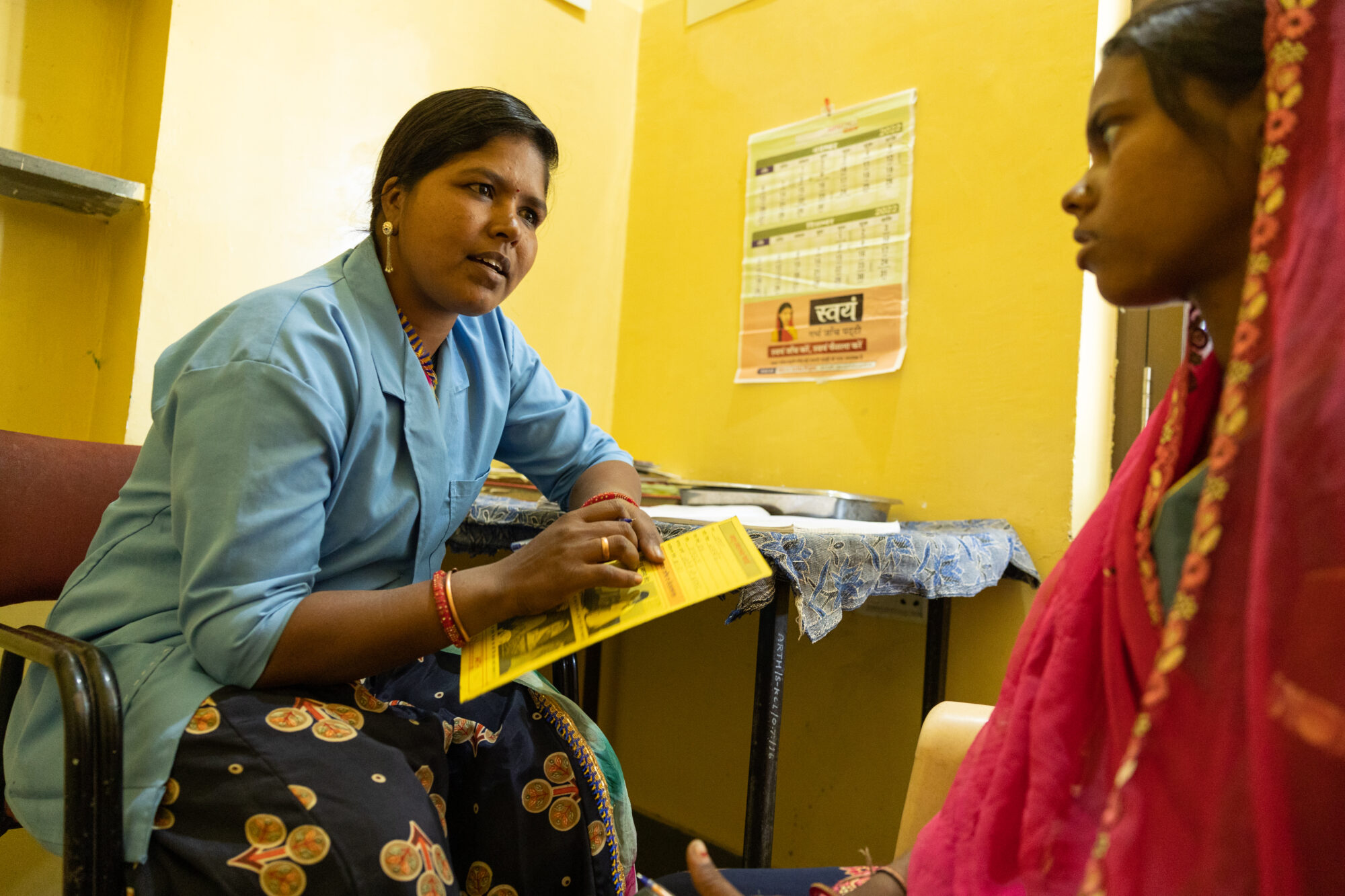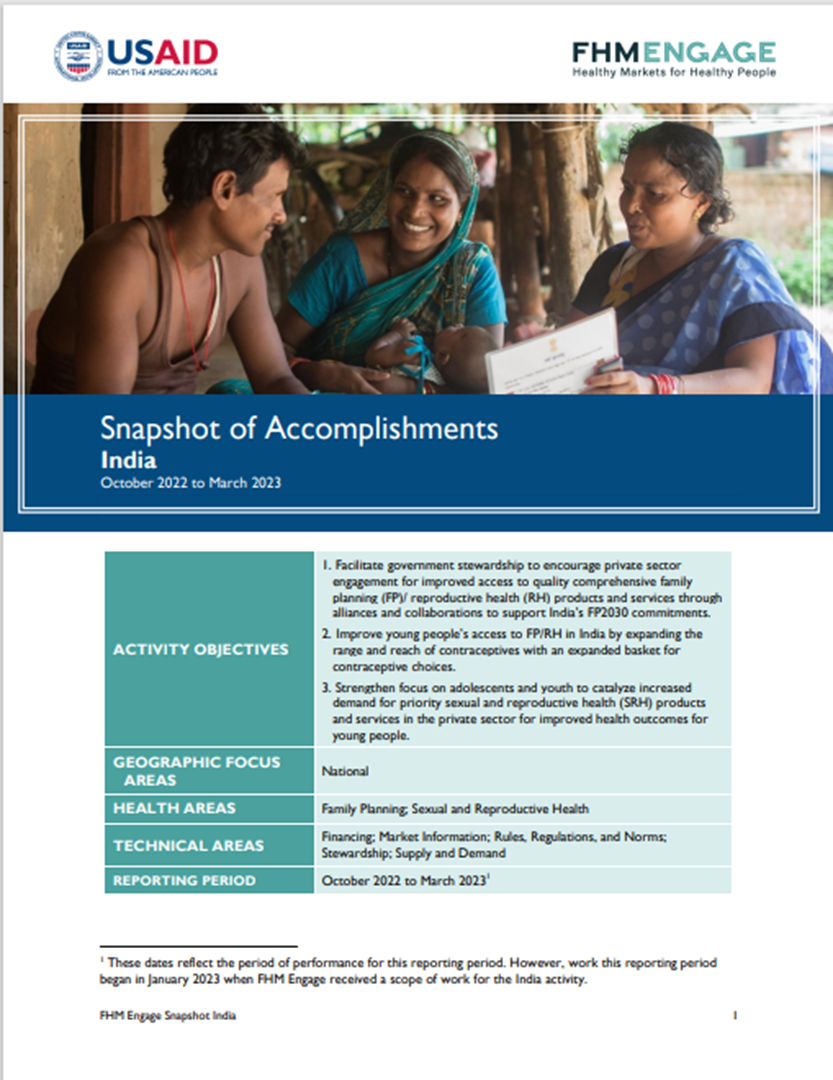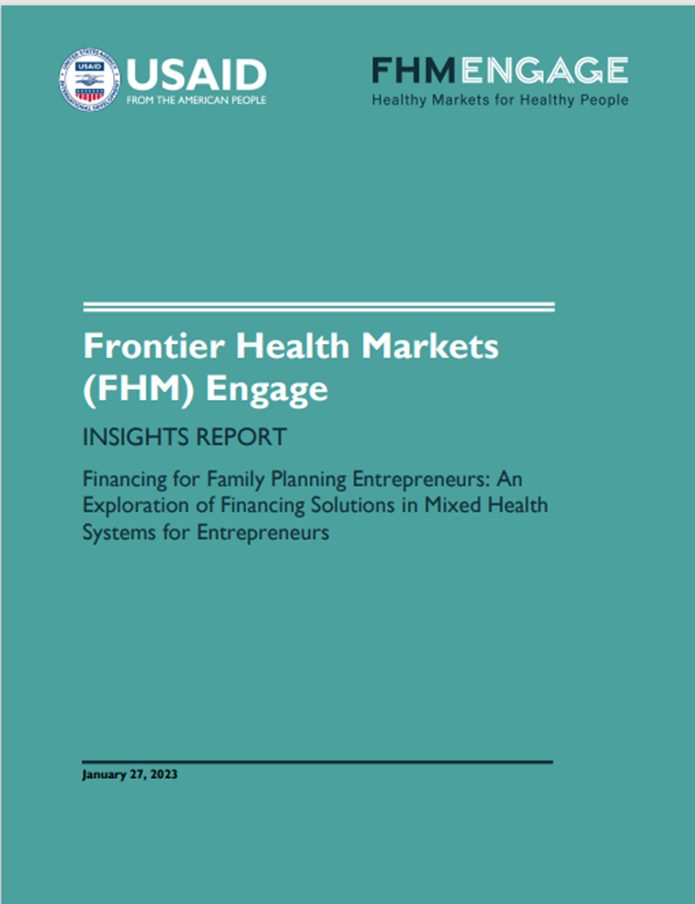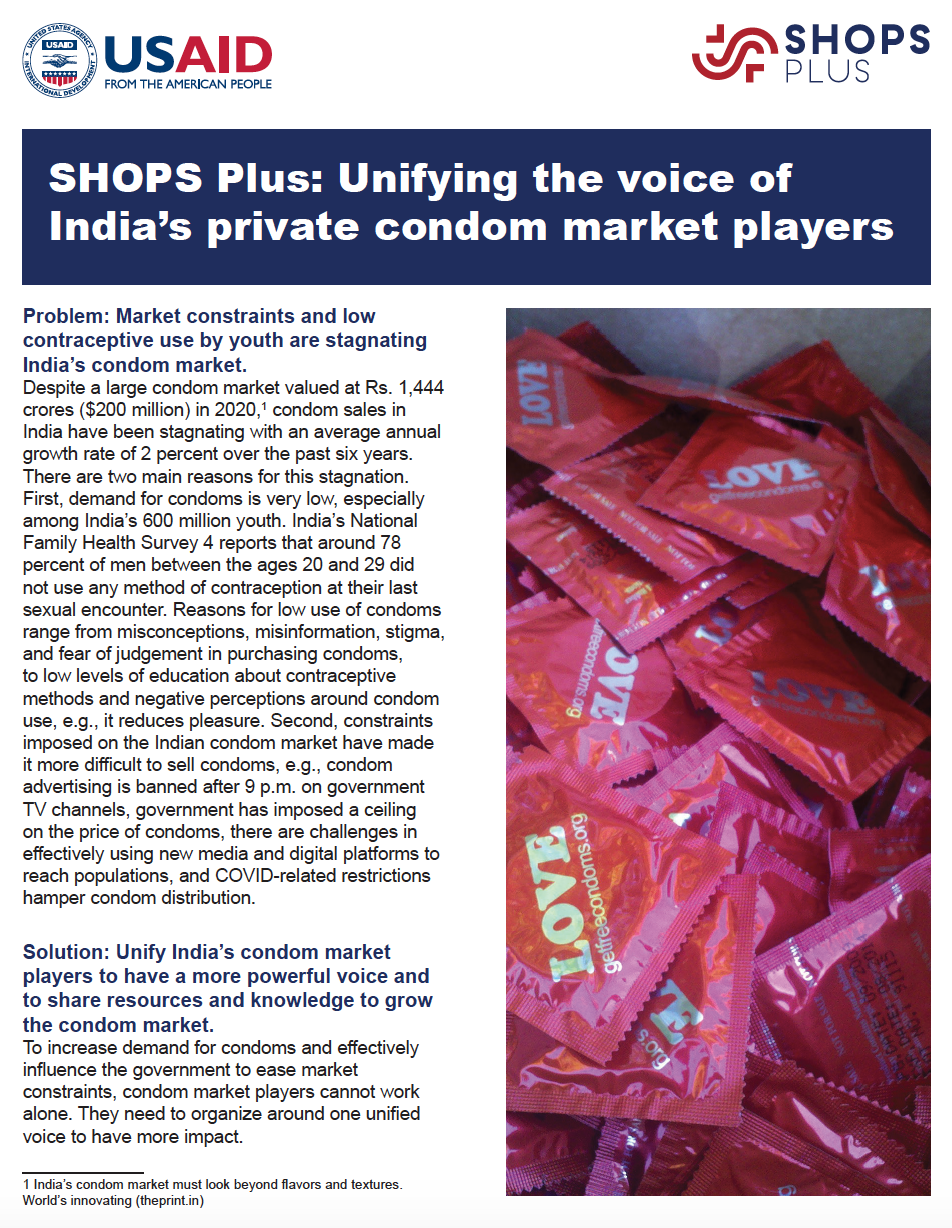
Resource Library
India Market Description 2023 (Abridged)
Resource Type : Presentation
Country : India
Year : 2023-12-21T04:30:15
Language : English
Project : FHM Engage

Resource Library
India Market Description 2023
Resource Type : Presentation
Country : India
Year : 2023-12-21T04:24:13
Language : English
Project : FHM Engage

Resource Library
FHM Engage India Fact Sheet
Resource Type : Brochure/Postcard
Country : India
Year : 2023-12-20T12:35:33
Language : English
Project : FHM Engage

Resource Library
FHM Engage India Market Description 2023
Resource Type : Presentation
Country : India
Year : 2023-11-30T18:42:12
Language : English
Project : FHM Engage

Pharmacies and Drug Shops - September 27, 2023
The Healthy Markets Community of Practice (HMCoP) is a group dedicated to generating awareness of market development and private sector engagement work happening in different countries and for participants to leave with a greater understanding and appreciation of the country’s health market. The speakers for September represented MOMENTUM, Society for Family Health, SwipeRx, inSupply Health, IQVIA, and Maisha Meds.
The September meeting of the Healthy Markets Community of Practice (HMCoP) focused on pharmacies and drug shops (PDS) and their utilization as platforms for provision of family planning (FP) products and services. To start the session, co-host USAID Senior Private Sector Advisor Andrea Bare introduced the participants to this month's theme and its importance to the HMCoP. Previous work done by SHOPS Plus showed that in 36 USAID-focus countries, 41 percent of women get their method from pharmacies or drug shops. In other words, in USAID-focus countries, one in three women get their FP products and services from the private sector.
The September meeting of the Healthy Markets Community of Practice (HMCoP) focused on pharmacies and drug shops (PDS) and their utilization as platforms for provision of family planning (FP) products and services. To start the session, co-host USAID Senior Private Sector Advisor Andrea Bare introduced the participants to this month's theme and its importance to the HMCoP. Previous work done by SHOPS Plus showed that in 36 USAID-focus countries, 41 percent of women get their method from pharmacies or drug shops. In other words, in USAID-focus countries, one in three women get their FP products and services from the private sector.
Following the comments from Mr. Nasiruzzaman, HMCoP Lead Facilitator and FHM Engage Chief of Party for Tanzania Farhan Yusuf introduced the agenda and the speakers for the first presentation.
In the next part of the meeting, speakers gave rapid presentations on their work.
Dr. Velonirina Andrianifahanana Program Manager, PSI, presented on MOMENTUM Private Healthcare Delivery (MPHD) which focuses on strengthening child health (CH)/FP quality of care among drug shop providers in Madagascar. In Madagascar, drug shops are the primary source of pharmaceutical products but cannot currently provide CH or FP services and are also sparse in rural and remote areas. To bridge this gap, the project is working with the Ministry of Health to develop an accredited drug shop program (ADDOs) to expand and improve the quality of CH/FP service offerings. To accomplish this, MPHD developed a global curriculum for integrated CH and FP services which includes comprehensive content that encompasses diarrhea, malnutrition, malaria, FP counseling, and referrals. The project also includes training, supervision, and evaluation. MPHD is currently providing training to approximately 60 drug shops in two regions and supervision is or will be occurring monthly or quarterly with supplemental digital coaching. Later, the evaluation will consist of a 12-month study to assess the feasibility and effectiveness of the training and follow-up supervision, monitoring of client satisfaction, and costing of the intervention components.
Dr. Uchenna Okafor, Project Director, Society for Family Health (SFH), presented his study to identify the major economic, socio-cultural, and behavioral drivers for and barriers against demand for FP products and services using hybrid e-pharmacy channels in Lagos State, Nigeria. The study sought to answer three important questions: 1) Who are the current and potential customers/users of hybrid e-pharmacy platforms? 2) How does the e-pharmacy platform currently inspire and attract FP clients? 3) To what extent are e-pharmacists and telemedicine providers willing and able to provide FP products and services through hybrid e-pharmacy models? To answer these questions SFH interviewed 30 pharmacists and telemedicine providers. Through these interviews, the study found that e-platform users tended to be younger, female, and reside in urban areas while non e-pharmacy users tended to be older (over 45), male, reside in rural/peri-urban areas, and have low levels of education. E-Pharmacists reported that there is a higher demand for condoms and oral contraceptives due to low levels of stigmatization, lack of awareness of alternatives, peer influence, affordability, and convenience. It was found that a lack of uptake of other methods like intrauterine devices (IUDs) and injectables was due to low levels of awareness of other methods, peer influence, fears of insertion/injections on the part of both providers and patients, and anchoring (meaning clients were biased towards a product so e-pharmacists found it hard to promote alternatives). Several operational and logistical barriers exist that inhibit e-pharmacists from engaging with clients including network issues, incorrect client contact information, and low stock levels. This study recommends improving client experiences through AI chatbots or use of video calls as well providing free delivery and tutorial videos to enhance and improve e-pharmacy platforms and FP service delivery.
Josselyn Neukon, Senior Vice President Public Health, SwipeRx gave an overview of SwipeRx, an all-in-one app for pharmacy professionals. Created in 2017, SwipeRx is the largest digital network of pharmacies in Southeast Asia and connects 260,000 users, of which 78 percent identify as women, from more than 55,000 pharmacies across six countries, where four in ten users work in rural pharmacies. The app allows pharmacy professionals to connect with each other, find accurate drug and health information, access free continuing professional development training, order pharmacy supplies, and access practical tools to improve the efficiency of their operations. Commercial and global health partners work with SwipeRx to access the pharmacy channel with speed and scale that is not feasible using offline methods to increase pharmacy contributions to primary health care, infectious diseases, NCDs, and market development. The impact of SwipeRx can be seen through its effect on both pharmacy capacity and pharmacy supply chain. In terms of pharmacy capacity, in 2022 more than 66,000 users accessed education modules through the app. Also, data collected in 2023 demonstrated that pharmacists educated through the app are more likely to adhere to recommended clinical care, client counseling, and waste management practices. In terms of pharmacy supply chain in Indonesia, SwipeRx is the largest purchasing network and is used by over 8,000 pharmacies across 116 cities and districts, representing 25 percent of all registered pharmacies. In Vietnam and Cambodia, it partners with manufacturers and quality assured health products and connects users and commercial suppliers. By focusing on the pharmacy supply chain, SwipeRx is able to leverage its network to improve availability and affordability of essential medicines and other health products at discounted prices.
Laura Nabwire, Practice Lead inSupply Health, presented their health market test project that focuses on strengthening pharmacy provision of contraceptives in Kenya. inSupply Health is an East Africa health advisory firm and a subsidiary of JSI Research & Training Institute that focuses on improving health outcomes through strengthening health systems and supply chains. The goal of the market test project is to develop and test the viability and scalability of a pharmacy business model with a focus on contraceptive products, particularly self-injection of subcutaneous depot medroxyprogesterone acetate (DMPA-SC). Objectives are to 1) increase the number of women accessing FP products and services at pharmacies, 2) document the value for pharmacies to offer DMPA-SC and other self-care products, and 3) expand the network of pharmacies implementing viable business models that offer quality counseling, training, and FP products. Several barriers exist when it comes to the pharmacy business model including large dependence on the public sector, low demand from customers, and no clear viable path of profitability. Unfavorable government policies need to be addressed, but in the last five years key policy changes have created a more favorable environment for pharmacists to operate. Currently the project is in its second of three phases, solution testing to bring business models to scale. Some key solutions identified to address current problems in pharmacies include the creation of a client retention program, creating safe (private) spaces, pharmacy mentorship, branding, and continuous product availability.
Rashid Khan, Biostatistician, IQVIA spoke on networking the supply chain to drive access, efficiencies, and product choice. The IQVIA platform connects companies to distributors and distributors to pharmacies and drug shops. The platform has a wide-reaching network and currently has more than 30,000 pharmacies and over 450 distributors. This platform brings all the distributors and all the pharmacies together onto the same platform and then enables them to interact with each other. The platform also processes approximately 17,000 orders a day which translates to $300M annually. IQVIA operates in India, Saudi Arabia, and the United Arab Emirates with project pipelines in Jordan and Kenya. The manufacturer, distributor, and PDS network is complicated and requires that IQVIA address the challenges that are faced by each of the different stakeholders in the supply chain including overstocking/understocking, leakages, restricted market reach, and limited visibility between orders and delivery. IQVIA also looks to support implementation and functional outcomes for platform users. Functional outcomes include increased geographical reach, access to multiple suppliers, streamlining of pricing, and help to reduce stock outs. In addition, the platform drives adoption by focusing on infrastructure, cost, and interoperable systems. By keeping costs distributed across the supply chain, requiring minimal infrastructure to join, and integrating existing systems, IQVIA is able to increase uptake of the platform.
Dan Rosen, Director of New Business, Maisha Meds, focused on trends of FP imports in Madagascar. Maisha Meds builds innovative software and data solutions, programs, and capabilities across Sub-Saharan Africa to improve healthcare. Maisha Meds focuses on three types of solutions: 1) a digital point of sale tool which helps pharmacies track sales and manage inventory, 2) loyalty programs that provide discounted testing and medication to patients, and 3) proprietary data that is combined with alternative source of supply chain data to build a picture of consumption across the value chain. Demonstrated key impact metrics include better health outcomes for patients treated via the loyalty programs and approximately $25M raised in grant funding to support growth of its solutions. Facility data allows them to track choice product mix, prices, margins, and subnational variation. Margin analysis allows Maisha Meds to see which part of the supply chain is in need of intervention. The data that Maisha Meds uses in terms of their FP analysis is most useful when it comes to emergency contraceptives (EC), oral contraceptives (OC), injectables, IUDs, and misoprostol/mifepristone, but not for condoms and implants. Benefits include that the data is able to show the price to patients and then the markup at retail facilities and is able to give the sub-national overview of healthcare commodities consumption. Limitations are that the data is not fully representative of the market, is limited to four countries, does not capture 100 percent of the market, and is not easy to use.
To end, we extend a great thanks to all who participated in this session focusing on pharmacies and drug shops, particularly to those that took the time to speak and prepare slides. We are excited that there was such a positive response to this meeting and are pleased that we are continuing to facilitate connections and shared learning. We hope that participant engagement remains high and that organizations continue to share the progress of their work so that we may continue to facilitate this collective learning. We look forward to continued participation in future sessions.
Resources
To access additional resources on some of the topics mentioned during this meeting use the links below:
SwipeRx Strengthens Pharmacy Contributions to National Health Systems January 2023.pdf
Scaling Digital Quality Improvement through Pharmacies SwipeRx April 2023.pdf
Scaling-Impact-in-Asia-2022-Case-Study_SwipeRx_CIIP-Accenture-SMU.pdf
Future Meetings
The next HMCoP convening will focus on Kenya. The meeting is scheduled for October 31, 2023 and a calendar invite has been sent out. If you would like to take part in or contribute to this or another HMCoP session, or you would like to make us aware of an organization or project, please email Elizabeth Peña at (epena@fhm-engage.org) or Judy Mboya (jmboya@fhm-engage.org).
Questions?
Please email Judy Mboya (jmboya@fhm-engage.org or Elizabeth Peña (epena@FHM-Engage.org).
Recent Highlights
-
Written by :
-
Published on : 16-Oct-23
- Highlight Type : Event
- Country : , , , ,
- Project : FHM Engage
- Language : English

Resource Library
Snapshot of Accomplishments: India (Oct 2022 to March 2023)
Resource Type : Brief
Country : India
Year : 2023-07-25T18:42:37
Language : English
Project : FHM Engage

Resource Library
INSIGHTS REPORT Financing for Family Planning Entrepreneurs: An Exploration of Financing Solutions in Mixed Health Systems for Entrepreneurs
Resource Type : Report
Country : Democratic Republic of Congo, India, Kenya, Pakistan, Senegal, Zambia
Year : 2023-07-25T18:37:36
Language : English
Project : FHM Engage

FHM Engage Snapshot of Accomplishments in India, Liberia, Madagascar, Nigeria, and Tanzania (Oct 2022 to March 2023)
Halfway through our second year of project implementation, Frontier Health Markets (FHM) Engage teams took a moment to reflect on their progress and plans. From October 2022 to March 2023 – at the start of our second year – we focused on further aligning activities and deepening our understanding of specific product and geographic markets to identify areas where these markets are not meeting the needs of consumers, the root causes of these market constraints, and began to ideate on areas of intervention. For an overview understanding of our overall accomplishments in some of our field support countries, please review our FHM Engage Snapshots of Accomplishments (October 2022 to March 2023) in India, Liberia, Madagascar, Nigeria, and Tanzania.
Recent Highlights
-
Written by : FHM Engage
-
Published on : 24-Jul-23
- Highlight Type : News
- Country : , , , ,
- Project : FHM Engage
- Language : English

Resource Library
Leveraging Chatbots to Understand the Effect of the COVID-19 Pandemic on Family Planning Demand: Insights from Users in Four Countries
The COVID-19 pandemic has impacted both the supply of and demand for family planning commodities. Several analyses examined the effect of COVID-19 across the supply chain and potential impacts on use, as global actors work to avoid supply chain disruptions. These analyses have all drawn on supply-side data to inform their models, with limited insight into demand-side data. The reliance on supply-side data in many of the assessments of COVID-19’s impact can hide immediate changes in demand due to long procurement lead times, the availability of buffer stock at different points in the supply chain, and lags in sales data reported back up to manufacturers and distributors. Developing more rapid and low-cost approaches to monitoring changes in demand at the country and local levels can help governments and their private sector partners better anticipate shifts in the family planning market and prepare to address potential shocks. This study partnered with askNivi, an innovative AI-enabled chatbot, to deploy a rapid survey of women in 4 countries (India, Kenya, Nigeria, and South Africa) on their family planning use before and during the pandemic. This effort informed a rapid pulse check of the challenges that certain demographics of women faced accessing contraceptives during COVID-19 and the adaptations they made to continue accessing their chosen method. This information can help stakeholders across the supply value chain to better prepare for changes in demand within the dynamic context of the COVID-19 pandemic.
Resource Type :
Country : India
Year : 2022-03-30T17:00:00
Language : English
Project :

Resource Library
SHOPS Plus: Unifying the voice of India’s private condom market players
India has a large, yet stagnant condom market. To facilitate its growth, the SHOPS Plus project worked to unify India’s condom market players (such as marketers and manufacturers) through the creation of India’s first Condom Alliance. The brief presents the project’s approach, key achievements of the Alliance, and lessons learned along the way.
Resource Type : Brief
Country : India
Year : 2021-11-03T15:00:00
Language : English
Project : SHOPS Plus
Pagination
- Previous page
- Page 3
- Next page







